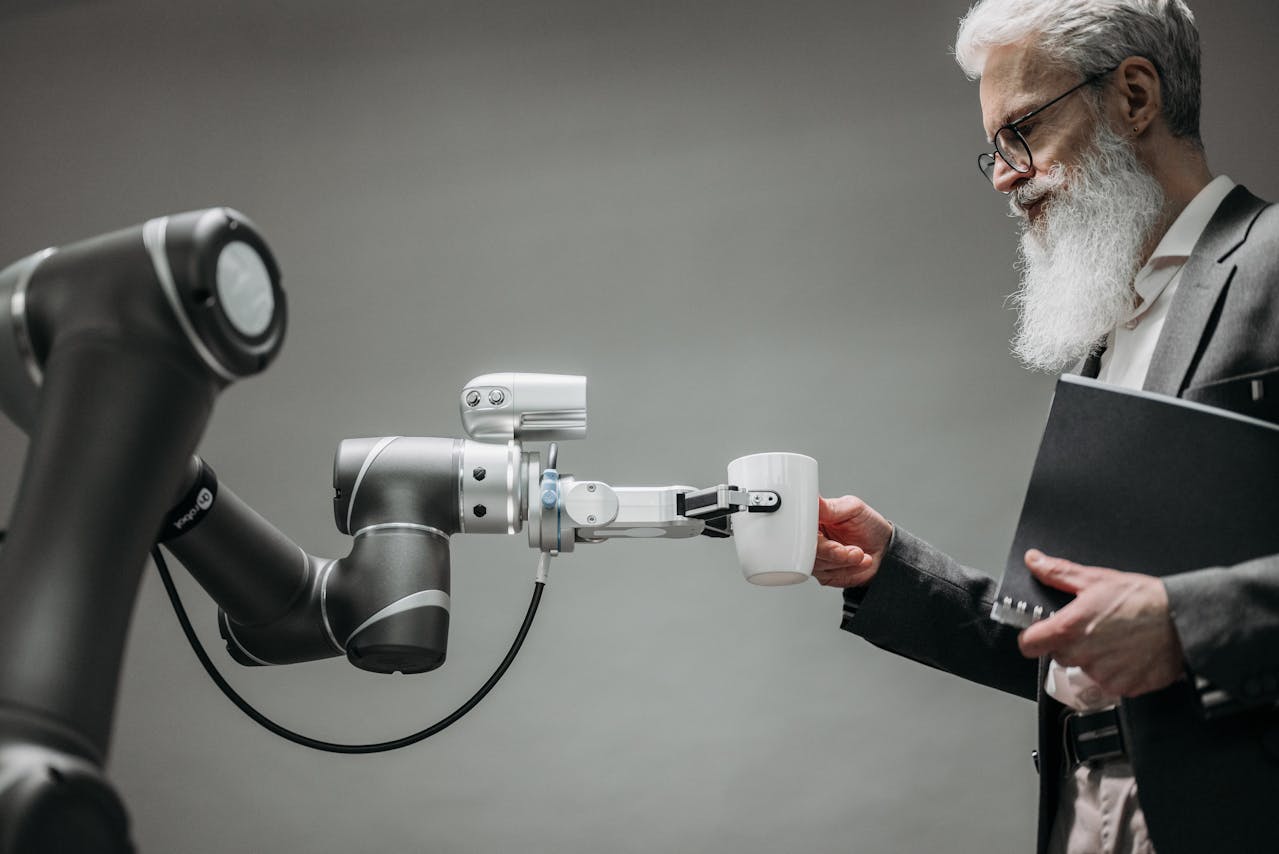Artificial Intelligence (AI) has become a transformative force for businesses across industries, driving efficiency, innovation, and competitive advantage. From automating repetitive tasks to delivering deep data insights, AI services are empowering organizations to optimize operations and enhance customer experiences. With the AI market projected to grow significantly in the coming years, businesses are increasingly seeking out the best AI services to meet their unique needs. In this article, we’ll explore some of the top AI services available in 2025, highlighting their key features, strengths, weaknesses, and the sectors where they shine. Whether you’re a small startup or a large enterprise, understanding these tools can help you make informed decisions about integrating AI into your operations.
The current date is March, 2025, and the AI landscape is evolving rapidly. Below, we’ll dive into eight standout AI services that are making waves in the business world: IBM Watson, Google Cloud AI, Microsoft Azure AI, Amazon Web Services (AWS) AI, Salesforce Einstein, OpenAI, H2O.ai, and DataRobot. Each offers unique capabilities tailored to different business challenges, and we’ll break down what makes them exceptional.
IBM Watson is a pioneering AI platform known for its advanced natural language processing (NLP), machine learning (ML), and data analytics capabilities. Launched by IBM, a company with over a century of technological innovation, Watson offers a suite of tools including Watson Assistant (for building chatbots), Watson Discovery (for extracting insights from unstructured data), and Watson Machine Learning (for custom model development). It’s designed to handle complex enterprise needs with a focus on scalability and integration.
- Versatility: Watson excels in processing unstructured data like text, images, and audio, making it ideal for businesses with diverse data types.
- Industry-Specific Solutions: IBM offers tailored versions of Watson for sectors like healthcare, finance, and legal, with pre-built models and compliance features.
- Robust NLP: Its ability to understand and generate human-like responses is among the best in the market.
Enterprise-Grade Security: Watson is built with strong data privacy and security protocols, appealing to regulated industries.
- Cost: Watson’s pricing can be steep, particularly for smaller businesses, as it’s designed for large-scale enterprise use.
- Complexity: Implementation requires technical expertise, which may necessitate additional training or hiring specialists.
Slower Adoption Curve: Compared to cloud-native competitors, Watson can feel less agile for rapid deployments.
Watson thrives in healthcare (e.g., analyzing medical records and assisting in diagnostics), financial services (e.g., fraud detection and risk management), and legal sectors (e.g., contract analysis). Its popularity is strong among large corporations that need robust, secure, and customizable AI solutions.
Google Cloud AI leverages Google’s expertise in machine learning and deep learning, offering tools like AutoML (for custom model building), Vision AI (for image recognition), and Natural Language API (for text analysis). It’s part of the broader Google Cloud Platform, integrating seamlessly with Google’s ecosystem of services like BigQuery and TensorFlow.
- Cutting-Edge Technology: Google’s leadership in AI research (e.g., BERT, Gemini) ensures state-of-the-art performance.
- Scalability: Built on Google’s infrastructure, it can handle massive datasets and high computational demands.
- Ease of Use: AutoML allows non-experts to create ML models, democratizing AI for smaller teams.
Integration: Works seamlessly with Google Workspace tools, enhancing productivity.
- Cost Variability: Pricing can escalate with heavy usage, making budgeting tricky for some businesses.
- Learning Curve: While AutoML simplifies model creation, advanced features require familiarity with Google’s ecosystem.
Dependency: Businesses heavily invested in non-Google ecosystems may face integration challenges.
Google Cloud AI shines in technology (e.g., software development and data analytics), retail (e.g., personalized recommendations), and media/entertainment (e.g., content categorization). It’s popular among tech-savvy businesses and startups leveraging Google’s infrastructure.
Microsoft Azure AI is a comprehensive AI suite within the Azure cloud platform, featuring tools like Azure Cognitive Services (for vision, speech, and language), Azure Machine Learning (for model training), and Copilot (a generative AI assistant). It’s tightly integrated with Microsoft 365 and Power BI, enhancing business intelligence.
- Broad Accessibility: Offers pre-built APIs and customizable models, catering to both beginners and experts.
- Generative AI: Copilot provides powerful text and code generation, boosting productivity across roles.
- Enterprise Integration: Seamless compatibility with Microsoft products makes it a go-to for existing Microsoft users.
Global Reach: Azure’s extensive data center network ensures low-latency performance worldwide.
- Cost: Advanced features can get expensive, especially for high-volume usage.
- Complexity for Non-Microsoft Users: Businesses not already in the Microsoft ecosystem may find integration less intuitive.
Resource Intensity: Some tools demand significant computational resources, challenging smaller firms.
Azure AI excels in manufacturing (e.g., predictive maintenance), customer service (e.g., chatbots), and professional services (e.g., data-driven consulting). It’s highly popular among enterprises already using Microsoft solutions.
AWS AI, part of the dominant AWS cloud platform, includes services like SageMaker (for building ML models), Lex (for conversational agents), and Rekognition (for image and video analysis). AWS is known for its vast scalability and extensive service offerings, catering to businesses of all sizes.
- Scalability: AWS’s infrastructure supports everything from startups to global giants.
- Wide Range of Tools: Offers solutions for nearly every AI use case, from NLP to computer vision.
- Cost Efficiency: Pay-as-you-go pricing can be economical for variable workloads.
Ecosystem: Integrates with AWS’s broader suite (e.g., Lambda, S3), streamlining workflows.
- Complexity: The sheer number of services can overwhelm new users without technical support.
- Customization Limits: Pre-built tools may lack the flexibility needed for highly specialized tasks.
Vendor Lock-In: Heavy reliance on AWS can make switching providers challenging.
AWS AI dominates in e-commerce (e.g., supply chain optimization), logistics (e.g., route planning), and healthcare (e.g., patient data analysis). It’s a favorite among businesses prioritizing scalability and cost flexibility.
Salesforce Einstein is an AI layer embedded within the Salesforce CRM platform, offering features like predictive analytics, lead scoring, and automated workflows. It’s designed to enhance sales, marketing, and customer service processes without requiring deep technical expertise.
- CRM Integration: Seamlessly enhances Salesforce’s core functionalities, boosting user adoption.
- User-Friendly: Requires minimal setup, making it accessible to non-technical teams.
- Predictive Insights: Excels at forecasting sales trends and customer behavior.
Automation: Streamlines repetitive tasks like email personalization and case routing.
- Limited Scope: Primarily focused on CRM, less versatile for non-Salesforce use cases.
- Dependency: Only valuable for businesses already using or willing to adopt Salesforce.
Cost: Adds to the already premium pricing of Salesforce subscriptions.
Einstein is a powerhouse in sales (e.g., lead prioritization), marketing (e.g., campaign optimization), and customer support (e.g., case management). It’s popular among businesses in retail, financial services, and B2B sectors reliant on CRM.
OpenAI, the creators of ChatGPT and DALL-E, offers API access to its powerful language and generative AI models. Businesses can use OpenAI for content creation, customer support automation, and even code generation, with flexible integration options.
- Generative Power: Best-in-class for creating human-like text, images, and more.
- Flexibility: APIs allow businesses to build custom applications tailored to their needs.
- Rapid Innovation: OpenAI’s ongoing research keeps it at the forefront of AI advancements.
Ease of Use: Simple integration for developers, with extensive documentation.
- Cost: High usage can lead to significant expenses, especially for large-scale applications.
- Ethical Concerns: Potential for bias or misuse in generated content requires oversight.
Limited Enterprise Focus: Lacks the built-in compliance features of competitors like IBM Watson.
OpenAI excels in marketing/advertising (e.g., content generation), education (e.g., personalized learning), and tech startups (e.g., app development). It’s popular among creative and innovative businesses.
H2O.ai is an open-source AI platform focused on machine learning and predictive analytics, offering tools like H2O Driverless AI (for automated ML) and H2O Sparkling Water (for big data integration). It’s designed for data scientists and businesses needing actionable insights.
- Automation: Driverless AI simplifies model building, saving time for data teams.
- Open-Source Roots: Offers cost-effective options with community support.
- Scalability: Integrates with big data frameworks like Hadoop and Spark.
Accuracy: Known for high-performing predictive models.
- Technical Expertise: Best suited for teams with data science knowledge.
- Limited Non-ML Features: Lacks broader AI capabilities like NLP or vision.
Smaller Ecosystem: Less comprehensive than giants like AWS or Azure.
H2O.ai is strong in finance (e.g., risk modeling), insurance (e.g., claims prediction), and telecom (e.g., churn analysis). It’s popular among data-driven enterprises with analytical focus.
DataRobot is an automated machine learning platform that accelerates model development and deployment. It offers features like automated feature engineering, model explainability, and time-series forecasting, targeting businesses seeking rapid AI adoption.
- Speed: Automates the ML pipeline, reducing deployment time significantly.
- Explainability: Provides transparency into model decisions, crucial for regulated industries.
- User-Friendly: Accessible to non-experts with a focus on business outcomes.
Integration: Works with various data sources and cloud platforms.
- Cost: Premium pricing may deter smaller businesses.
- Narrow Focus: Primarily ML-focused, lacking broader AI capabilities.
Scalability Limits: May struggle with extremely large datasets compared to cloud giants.
DataRobot shines in manufacturing (e.g., quality control), retail (e.g., demand forecasting), and healthcare (e.g., patient outcome prediction). It’s popular among mid-sized firms prioritizing speed and simplicity.
Choosing the best AI service for your business depends on your industry, budget, and technical capabilities. IBM Watson is ideal for enterprises needing secure, industry-specific solutions, while Google Cloud AI suits tech-forward firms leveraging cutting-edge tools. Microsoft Azure AI is perfect for Microsoft-centric businesses, and AWS AI offers unmatched scalability for diverse needs. Salesforce Einstein enhances CRM-driven operations, OpenAI powers creative and generative tasks, H2O.ai excels in predictive analytics, and DataRobot accelerates ML deployment.
For small businesses, OpenAI and Salesforce Einstein offer accessible entry points. Large enterprises may prefer AWS, Azure, or Watson for their robustness. Tech startups lean toward Google Cloud AI and OpenAI for innovation, while regulated sectors like finance and healthcare favor Watson and DataRobot for compliance.
As AI continues to evolve, these services will adapt, offering even more value. Evaluate your goals—whether it’s automation, insights, or customer engagement—and select the service that aligns best with your vision. In 2025, the right AI tool isn’t just a luxury: it’s a strategic necessity.
Related articles





